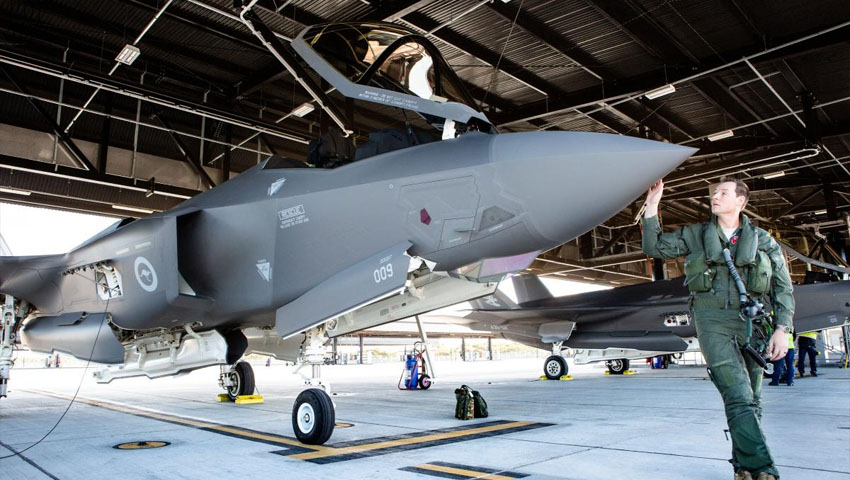The US Senate Armed Services Committee has responded to growing concerns regarding Chinese aggression in the Indo-Pacific, calling for increased expenditure and forward deployment of key munitions and, critically for Australia, the potential to host a regional F-35 hub.
To continue reading the rest of this article, please log in.
Create free account to get unlimited news articles and more!
For the first time in nearly a century, two great powers stare across the vast expanse of the Pacific, the incumbent heavyweight champion – the US, tired and battle-weary from decades of conflict in the Middle East – is being circled by the upstart – China, seeking to shake off the last vestiges of the “century of humiliation” and ascend to its position as a world leader.
US President Donald Trump has sought to counter the rise of China by providing an unprecedented level of funding to the US Armed Forces, with a focus on expanding the modernisation and replacement schedule of Cold War-era legacy platforms in favor of fifth-generation air, land, sea and multidomain capabilities supported by an expected budget of US$738 billion for FY2020, with US$740.5 billion expected for FY2021.
As the challenges continue to mount, the US Senate Armed Services Committee has officially launched a Pacific Defense Initiative (PDI) to allocate funding and resourcing to better support tactical and strategic posture.
As part of the proposed PDI, the US Senate is asking for US$7 billion ($10.2 billion) to help support America's largest combatant command, INDOPACOM counter the rise of China and Russia.
The Senate Armed Services Committee has requested US$1.4 billion ($2 billion) for next year, with an additional US$5.5 billion ($8 billion) for the fiscal year 2022 to augment missile defence in support of regional partners, and critically, forward deploy more troops in the Indo-Pacific.
This comes in addition to a US$20 billion ($33.35 billion) request made earlier in the year, which aims to expand the qualitative and quantitative edge enjoyed by the US and support the regional alliance frameworks, which head of INDOPACOM, Admiral Phil Davidson describes as "Regain the Advantage".
"Regain the Advantage is designed to persuade potential adversaries that any pre-emptive military action will be extremely costly and likely fail by projecting credible combat power at the time of crisis, and provides the President and Secretary of Defense with several flexible deterrent options to include full OPLAN [operation plan] execution, if it becomes necessary," ADM Davidson is quoted by DefenseNews.
The 2021 National Defense Authorization Act (NDAA), released by the Senate Armed Services Committee, states, "The best way to protect US security and prosperity in Asia is to maintain a credible balance of military power but, after years of underfunding, America's ability to do so is at risk."
A critical component of the approved NDAA includes plans for the US Air Force to establish a new F-35A Joint Strike Fighter operating facility in the Indo-Pacific "quickly to posture ready forces in our priority arena", the committee states.
This was expanded upon by committee chairman, senator Jim Inhofe, who articulated the growing need for more F-35s in the Indo-Pacific, stating, "It doesn't matter how many F-35s the military buys if very few are stationed in the region, their primary bases have little defence against Chinese missiles, they don't have secondary airfields to operate from, they can't access prepositioned stocks of fuel and munitions, or they can't be repaired in theatre and get back in the fight when it counts.
"The Pacific Deterrence Initiative will incentivise increased focus on posture and logistics, and help measure whether these requirements are being matched with resources."
The PDI follows on from the original 'European Deterrence Initiative', which was established in the aftermath of Russia's pseudo-invasion of the Crimea in 2014, something that has drawn the attention of Randall Schriver, the Pentagon's former top-Pacific policy official, seeing similarities between Crimea and the rising challenge of China in the Indo-Pacific.
This renewed posturing, tied to funding provides an opportunity for Australia to position the nation as a potential integrated hub for all US and allied F-35s operating in the Indo-Pacific with the added security and industry advantages associated with the Australia-US alliance.
Stephen Kuper
Steve has an extensive career across government, defence industry and advocacy, having previously worked for cabinet ministers at both Federal and State levels.

 Login
Login








